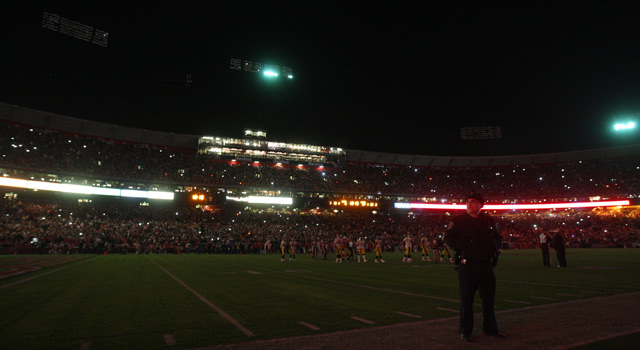
The National Football League (NFL) is trying to convince the Federal Communications Commission (FCC) to preserve 39-year-old blackout rules that prevent games from being televised locally when tickets remain unsold. Last season, two games were blacked out locally in the regular season, while several blackouts were narrowly averted in the playoffs.
The FCC considered a proposal to eliminate its blackout rules last November, with then-acting Chairwoman Mignon Clyburn saying that the rules are outdated. Today, the rules aren’t actually responsible for the majority of blackouts, and they "have little relevance for sports other than professional football, because the distribution rights for most of the games in these sports are sold by individual teams, rather than the leagues,” the FCC said.
But they do matter to football. Naturally, the NFL wants to keep the rules in place—and argues that they are good for fans. Despite being the richest sports league in the country with more than $9 billion in annual revenue, the NFL said in an FCC filing that sports blackout rules are a “critical contributing factor” to its “ability to maintain its ‘free TV model.’”
The NFL’s filing, sent on Monday and posted on the FCC website on Wednesday, recounts a meeting NFL officials had with FCC staff and which the league laid out its case.
“Professional football is the only sport for which fans have access to all of the sold-out games of their home team without having to pay an expensive monthly fee for cable or satellite service," the league wrote. "NFL representatives said that the current system clearly serves the public interest by making professional football games available to the estimated 60 million Americans who rely on free TV for their access to broadcast programming. They emphasized that, if the current system were changed and NFL games were to move to pay-TV, fans who wanted to watch their home team would have to pay a $60-80 fee per month, and a significant number of fans likely would not be able to afford that premium. That result would represent a substantial loss of consumer welfare.”
The league's blackout policy has changed a bit over the years, with teams being able to lower the threshold that determines if a game is "sold out." The NFL also claims that its blackout policy “tempers clubs’ incentive to raise ticket prices” by increasing in-person attendance.
Fans convinced the FCC to act
Fans don't always see it that way.
The FCC opened its recent sports blackout proceeding after a 2011 petition by several groups representing fans, which said that the rules are "anti-consumer." The petition accused the NFL of “charg[ing] exorbitant prices for tickets,” resulting in lower attendance, and then punishing fans by blacking out games if seats remain unsold.
“In November 2011, the Sports Fan Coalition, Inc., National Consumers League, Public Knowledge, League of Fans, and Media Access Project filed a joint Petition for Rulemaking urging the Commission to eliminate the sports blackout rules,” the FCC wrote in a Notice of Proposed Rulemaking in December 2013. “The Petitioners assert that, at a time when ticket prices for sports events are at historic highs and high unemployment rates persist, making it difficult for many consumers to afford attending local sports events, the Commission should not support the ‘anti-consumer’ blackout policies of professional sports leagues. The Petitioners also argue that the sports leagues’ blackout policies are no longer needed to protect gate receipts and therefore should not be facilitated by the Commission’s sports blackout rules.”
The FCC tentatively agreed with the petition.
“We propose to eliminate the sports blackout rules,” the FCC wrote. “The sports blackout rules were first adopted nearly four decades ago to ensure that the potential loss of gate receipts resulting from cable system importation of distant stations did not lead sports clubs to refuse to sell their rights to sports events to distant stations, which would reduce the overall availability of sports programming to the public. The rules were extended to open video systems and then to satellite carriers to provide parity between cable and newer video distributors. The sports industry has changed dramatically in the last 40 years, however, and the Petitioners argue that the economic rationale underlying the sports blackout rules may no longer be valid.”
Even if the FCC ends its oversight of blackouts triggered by low attendance, that doesn’t mean blackouts will stop completely.
“Elimination of our sports blackout rules will not prevent the sports leagues, broadcasters, and cable and satellite providers from privately negotiating agreements to black out certain sports events,” Clyburn said when she proposed eliminating the rules.
Privately negotiated blackouts also prevent fans from watching local games over the Internet if they haven’t purchased a pay-TV subscription. For example, the NBA, NHL, and MLB offer streaming services that can be purchased without a pay-TV subscription—but they only show out-of-market games.
Listing image by NFL
reader comments
216